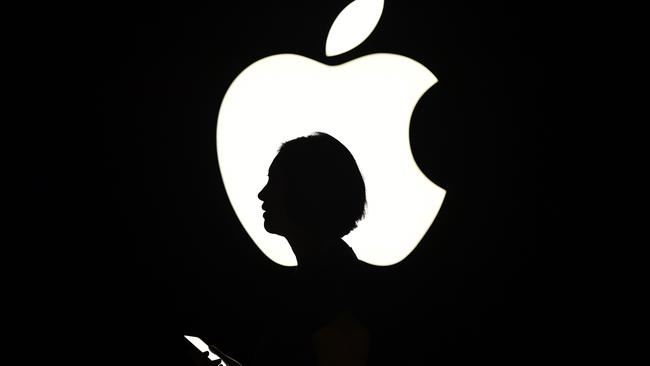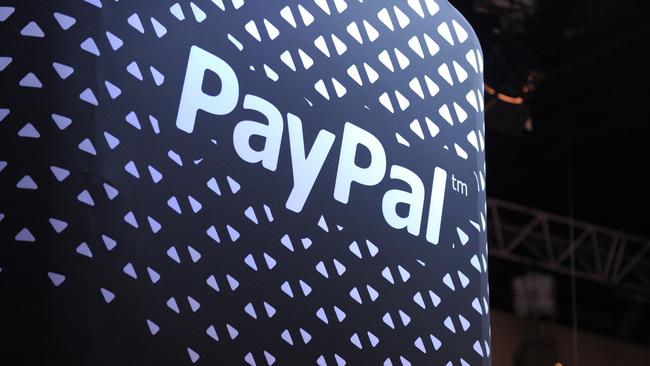Afterpay, Zip tumble as PayPal, Apple, muscle in on BNPL sector
Giants PayPal and Apple could ‘stomp’ on smaller rivals as they enter the booming buy now, pay later sector, analysts warn.

Investor jitters over plans by global technology giants PayPal and Apple to muscle in on the burgeoning buy now pay later sector sent shares in locally listed groups Afterpay and Zip tumbling on Wednesday.
PayPal is seeking to shake-up the Australian instalments payment market through the launch on Wednesday of its own buy now, pay later service, which avoids slugging customers with late fees.
The PayPal Australia announcement was briskly followed early on Wednesday by a Bloomberg report signalling tech heavyweight Apple was working on its own buy now, pay later service, in partnership with Goldman Sachs.
Bloomberg cited unidentified people with knowledge of Apple’s plan, and the report triggered a drop of as much as 13 per cent in shares of buy now, pay later group Affirm in US trading, while PayPal’s stock dipped about 1.4 per cent, according to the report.
Local investors were also skittish on news of the strategic moves by PayPal and Apple. Afterpay’s shares plummeted 9.6 per cent to $107 on Wednesday, while Zip’s stock dropped 11.4 per cent to $7.32. Humm Group, which is not a pure-play buy now pay later operator, saw its shares decline almost 4 per cent to 97c.
The buy now, pay later sector has been a hive of activity this week, and investors were scrambling to work out how the power plays would filter through the market.
An Afterpay spokeswoman on Wednesday said the company’s model went beyond pay in four instalments and it was a “marketing partner” to merchants and retailers.
“The Afterpay platform has always delivered a unique value proposition to customers and retailers. It has never been about merely offering a transaction solution,” she added.
“We have achieved the growth we have because we have flipped the traditional credit model on its head and in the process built a platform that drives significant incremental value for our merchants... we are not a loan provider, we never charge interest or use credit checks.”
A Zip spokesman said: “Apple’s move into BNPL is validation that what Zip has been doing is resonating with customers and merchants. We 100 per cent welcome the competition – competition drives keen pricing and great products and that is good for customers, which is what Zip is all about.”
Also on Wednesday morning, Westpac said it was teaming up with Humm in New Zealand to exclusively offer its buy now, pay later product bundll.
Humm entered into a joint venture agreement with Red Bird Ventures - a unit of Westpac New Zealand, to offer bundll to the Kiwi consumer finance market. The arrangement sees Red Bird get the option to take an equity stake in bundll NZ.
The much anticipated PayPal Pay in 4 launch comes after the payments behemoth earlier rolled out the service in the US, Britain and France.

PayPal wants to make a splash in this market by charging merchants the same fees it does for other payments and taking late fees completely out of the equation. It says it is the first to not levy late payment charges on buy now, pay later transactions in Australia.
PayPal says it will conduct an assessment of customers they allow to access the buy now, pay later option, which is just one of several payment choices available online and through its digital wallet.
The company has more than nine million active Australian accounts, and it will predominantly use its own data and analytics engine to assess suitability, while for new customers or to draw on additional information, it will run credit checks through companies including Equifax.
Commonwealth Bank is also pushing further into buy now, pay later with a direct service called StepPay for existing customers, which will launch soon.
Payments expert McLean Roche Consulting’s Grant Halverson said the large tech and payments groups would have a notable impact in the buy now, pay later sector.
“It’s the result of the BNPL relentless spin and bluster, it’s attracted big industry players who will kill off most of them – literally stomp on them,” he added.
“Apple Pay and Goldmans are the latest ‘elephants’ to enter the BNPL critical USA race.
“Apple in USA who have 44 per cent of phone market and 90 million Apple Pay users - plus a relentless approach to security that customers love (I’m an Android user) - you have a very serious player. Goldmans with its Marcus experience will provide funding, data and credit expertise.”
RateCity’s research director Sally Tindall said despite having no late fees, consumers needed to be mindful if they didn’t repay PayPal instalment purchases it could damage their credit file.
Macquarie Group analysts told clients the removal of late fees from their Afterpay valuation would result in a decline to $130 from $140 per share.
“Zip’s account-based product construct consumers already show a willingness to incur ongoing fees we believe they would be less sensitive to the potential for an alternative ‘no late fee’ pay in 4 product.”
The analysts also said intensifying competition in the sector would trigger rationalisation.
“We expect a period of consolidation within the industry before seeing a better outlook for the industry overall,” Macquarie said. “Our recent adjustments for Afterpay have already factored in market share loss in Australia partially reflecting the increasing competitive landscape.”
Jefferies analysts highlighted the dominance of Afterpay and Zip in Australia, and that any Apple buy now, pay later product would take time to arrive here.
“There are some important distinctions with Apple’s products. PayPal could be a risk in Australia, but it is quite a mature market dominated by Afterpay and Zip,” they said.
“Apple may not have the same level of direct merchant integration as Afterpay and Zip, which may prevent it from doing marketing with the brands. The Apple product seems to target credit card users, whereas the vast majority of Afterpay and Zip’s customers actually shun credit cards.”




To join the conversation, please log in. Don't have an account? Register
Join the conversation, you are commenting as Logout